- ↑ Chen Shi is erroneously referred to in Zhuge Liang's biography in the Sanguozhi as "Chen Jie" (陳戒).
Related Research Articles

The Battle of Xiaoting(猇亭之戰), also known as the Battle of Yiling and the Battle of Yiling and Xiaoting, was fought between the state of Shu and the state of Wu, between the years 221 and 222 in the early Three Kingdoms period of China. The battle is significant because Wu was able to turn the situation from a series of initial losses into a defensive stalemate, before proceeding to win a decisive victory over Shu. The Wu victory halted the Shu invasion and preceded the death of Liu Bei, Shu's founding emperor.
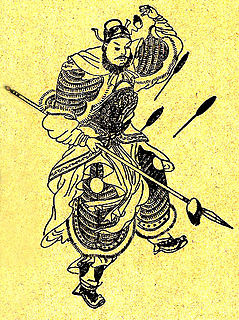
Zhang He, courtesy name Junyi, was a military general serving under the warlord Cao Cao in the late Eastern Han dynasty of China. He continued serving in the state of Cao Wei under its first two rulers, Cao Pi and Cao Rui, during the Three Kingdoms period until his death.
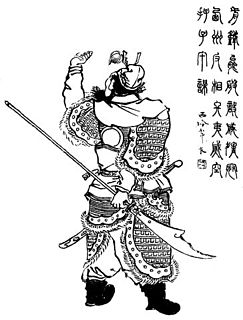
Wei Yan, courtesy name Wenchang, was a military general of the state of Shu Han during the Three Kingdoms period of China. Originally a subordinate of the warlord Liu Bei in the late Eastern Han dynasty, Wei Yan rose through the ranks and became a general when Liu Bei seized control of Yi Province in 214. His performance in battle helped him to become a prominent figure in the Shu military in a short period of time. He was later appointed as the Administrator of Hanzhong Commandery and as an Area Commander in 219. Between 228 and 234, he participated actively in the Northern Expeditions led by the Shu regent Zhuge Liang against Shu's rival state, Cao Wei. After Zhuge Liang's death in 234, Wei Yan was killed by another Shu general, Ma Dai, for alleged treason.

Chen Shou, courtesy name Chengzuo (承祚), was a Chinese historian, politician, and writer who lived during the Three Kingdoms period and Jin dynasty of China. Chen Shou is most known for his most celebrated work, the Records of the Three Kingdoms (Sanguozhi), which records the history of the late Eastern Han dynasty and the Three Kingdoms period. Chen Shou wrote the Sanguozhi primarily in the form of biographies of notable persons of those eras. Today, Chen's Records of the Three Kingdoms is part of the Twenty-Four Histories canon of ancient Chinese history.

Zhuge Liang's Northern Expeditions were a series of five military campaigns launched by the state of Shu Han against the rival state of Cao Wei from 228 to 234 during the Three Kingdoms period in China. All five expeditions were led by Zhuge Liang, the Imperial Chancellor and regent of Shu. Although they proved unsuccessful and ended up as a stalemate, the expeditions have become some of the best known conflicts of the Three Kingdoms period and one of the few battles during it where each side fought against each other with hundreds of thousands of troops, as opposed to other battles where one side had a huge numerical advantage.
Li Yan, courtesy name Zhengfang, also known as Li Ping, was a military general of the state of Shu Han during the Three Kingdoms period of China. He climbed to the zenith of his career when he was asked by the Shu emperor Liu Bei to be the military paramountcy and co-regent alongside Zhuge Liang for his son and successor, Liu Shan. After the death of Liu Bei, Li Yan was given the rank of General of the Vanguard which was last held by Guan Yu back in 220. Li served most of his career in the mid and late 220s as the area commander for the Eastern Front centered in Yong An with Chen Dao as his deputy; he never faced any major battles in his position. However, during the 230s and the 4th of Zhuge Liang's Northern Expeditions, Li Yan was given a higher rank of General of the Agile Cavalry, below only Zhuge Liang. He was assigned to handle logistics, but he was unable to deliver supplies to Zhuge Liang's army in a timely manner. After his attempt to fraudulently cover his inability to follow commands, Li Yan was stripped from positions and power.
Guo Huai, courtesy name Boji, was a military general of the state of Cao Wei during the Three Kingdoms period of China. He started his career towards the end of the Eastern Han dynasty under the warlord Cao Cao as a subordinate of Cao Cao's generals Xiahou Yuan and Zhang He. During the Three Kingdoms period, he served in Wei, the state established by Cao Cao's son Cao Pi, and lived through the reigns of four Wei emperors. From the 220s until his death in 255, he governed and defended Wei's western borders in Yong and Liang provinces. During this time, he resisted multiple invasions by Wei's rival state, Shu Han, and quelled some rebellions by local Qiang, Di and other non-Han Chinese tribes.
Hao Zhao, courtesy name Bodao, was a military general of the state of Cao Wei during the Three Kingdoms period of China. He is best known for his victory at the siege of Chencang in 229 when he led a successful defence of Chencang against an invasion by a much larger army from Wei's rival state Shu Han. However, he died of illness not long after that.
Li Hui, courtesy name De'ang, was an official of the state of Shu Han during the Three Kingdoms period of China. After refusing Liu Zhang's service, Li joined Liu Bei early in his campaign to pacify Yi province. After Liu Bei's death, Li Hui proved his talents during Zhuge Liang's Southern Campaign and was appointed the area commander in the south. He set the standard for his successors, such as Ma Zhong, for sound governance. After Shu-Han's co-regent Li Yan was removed from office, Li Hui was promoted again and sent to Hanzhong to assist in the Northern Expeditions but died a year later.
Fei Shi, courtesy name Gongju, was an official of the state of Shu Han during the Three Kingdoms period of China.
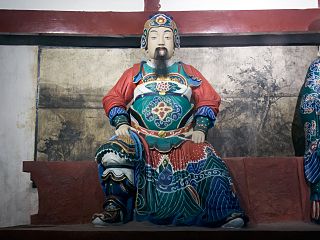
Deng Zhi, courtesy name Bomiao, was a government official, diplomat and military general of the state of Shu Han during the Three Kingdoms period of China. A descendant of Deng Yu, Deng Zhi started his career in the late Eastern Han dynasty under the warlord Liu Bei as a low-level officer in Pi County. After Liu Bei discovered his talent, Deng Zhi steadily rose through the ranks to become a county prefect and later a commandery administrator and imperial secretary. In 223, the Shu regent Zhuge Liang sent him as Shu's envoy to meet Sun Quan, the ruler of Shu's ally state Wu, and reestablish the Wu–Shu alliance against their common rival state Wei. Deng Zhi succeeded in his mission and earned praise from Sun Quan for strengthening Wu–Shu ties. In 227, Deng Zhi became a military general and he participated in the first Shu invasion of Wei by leading a decoy force with Zhao Yun to distract the Wei general Cao Zhen. Although they lost the battle, Deng Zhi and Zhao Yun managed to rally their troops to put up a firm defence during their retreat and minimise their losses. Following Zhuge Liang's death in 234, Deng Zhi rose to higher general ranks and was stationed in present-day Chongqing for about 10 years before he was recalled back to the Shu capital Chengdu in his 70s to serve as General of Chariots and Cavalry. In 248, he suppressed a rebellion in Fuling. He died in 251.
Wu Ban, courtesy name Yuanxiong, was a Chinese military general of the state of Shu Han in the Three Kingdoms period of China.
Zhuge Qiao (204–228), courtesy name Bosong, was an official of the state of Shu Han in the Three Kingdoms period of China. He was the adopted son of Zhuge Liang, the Imperial Chancellor and regent of Shu from 223 to 234. His biological father was Zhuge Liang's elder brother Zhuge Jin, a military general of Shu's ally state, Eastern Wu.
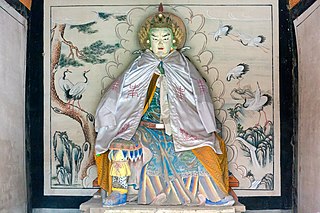
Yang Yi, courtesy name Weigong, was an official of the state of Shu Han in the Three Kingdoms period of China.
Chen Dao, courtesy name Shuzhi, was a military general of the state of Shu Han in the Three Kingdoms period of China. He previously served under the warlord Liu Bei, the founding emperor of Shu Han, in the late Eastern Han dynasty.
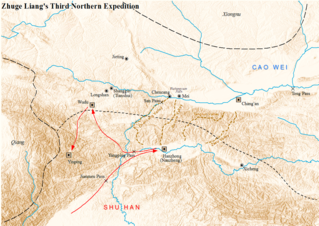
The Battle of Jianwei was fought between the contending states of Shu Han and Cao Wei in the Three Kingdoms period of China. The battle was also the third of a series of military campaigns against Wei launched by Shu's chancellor, Zhuge Liang. The battle concluded with a Shu victory and the capture of Wudu and Yinping commanderies, which were located near present-day Longnan, Gansu.
Wu Yi courtesy name Ziyuan was a Chinese military general of the state of Shu Han in the Three Kingdoms period of China. His younger sister, Empress Mu, was the empress consort of Shu's founding emperor, Liu Bei. Wu Yi had a younger relative, Wu Ban, who also served as a general in Shu.

Xiang Chǒng was a military officer of the state of Shu Han during the Three Kingdoms period of China. In the Chu Shi Biao, Zhuge Liang named Xiang Chǒng as a capable subject of good character and someone well-versed in military affairs, and urged Liu Shan to put Xiang Chǒng's talents to good use. He was a nephew of the Shu scholar Xiang Lang.
Zhuge Rong, courtesy name Shuchang, was a military general of the state of Eastern Wu during the Three Kingdoms period of China. He was the third son of Zhuge Jin, a military general who served under Wu's founding emperor Sun Quan, and a younger brother of Zhuge Ke, a military general who briefly served as regent for Sun Quan's successor, Sun Liang.
Yang Xi, courtesy name Wenran, was an official of the state of Shu Han during the Three Kingdoms period of China. He is best known for writing the Ji Han Fuchen Zan, a collection of praises of notable persons who served in the Shu Han state. Chen Shou, the third-century historian who wrote the Records of the Three Kingdoms (Sanguozhi), extensively quoted and annotated Yang Xi's collection.
References
- ↑ (春,漢諸葛亮遣其將陳戒攻武都、陰平二郡,雍州刺史郭淮引兵救之。) Zizhi Tongjian vol. 71.
- ↑ (七年,亮遣陳戒攻武都、陰平。) Sanguozhi vol. 35.
- ↑ (備遣陳式等十餘營絕馬鳴閣道,晃別征破之,賊自投山谷,多死者。) Sanguozhi vol. 17.
- ↑ ([章武]二年春正月,先主軍還秭歸,將軍吳班、陳式水軍屯夷陵,夾江東西岸。) Sanguozhi vol. 32.
- ↑ ([建興]七年春,亮遣陳式攻武都、陰平,遂克定二郡。) Sanguozhi vol. 33.
- ↑ ([建興]七年,亮遣陳戒攻武都、陰平。魏雍州刺史郭淮率衆欲擊戒,亮自出至建威,淮退還,遂平二 i id="mwaQ">Sanguozhi vol. 35.
- Chen, Shou (3rd century). Records of the Three Kingdoms (Sanguozhi).
- Luo, Guanzhong (14th century). Romance of the Three Kingdoms (Sanguo Yanyi).
- Pei, Songzhi (5th century). Annotations to Records of the Three Kingdoms (Sanguozhi zhu).
- Sima, Guang (1084). Zizhi Tongjian .
| Chen Shi | |||||||||
|---|---|---|---|---|---|---|---|---|---|
| Traditional Chinese | 陳式 | ||||||||
| Simplified Chinese | 陈式 | ||||||||
| |||||||||
Prominent people of Shu Han | |
|---|---|
| Emperors | |
| Empresses | |
| Princes and royal figures | |
| Regents | |
| Civil officers |
|
| Military officers |
|
| Other notable women | |
| Other notable figures | |